Addressing Disparities in Local Economic Development Implementation across Councils in Tanzania
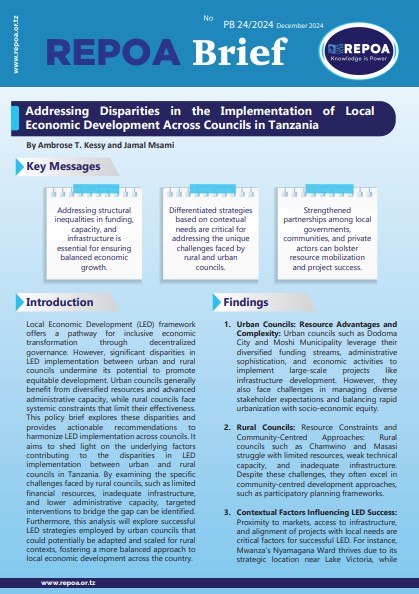
This policy brief explores these disparities and provides actionable recommendations to harmonize Local Economic Development (LED) implementation across councils. This policy brief aims to shed light on the underlying factors contributing to the disparities in LED implementation between urban and rural councils in Tanzania. By examining the specific challenges faced by rural councils, such as […]
Strengthening Local and Regional Strategies for Economic Transformation in Tanzania
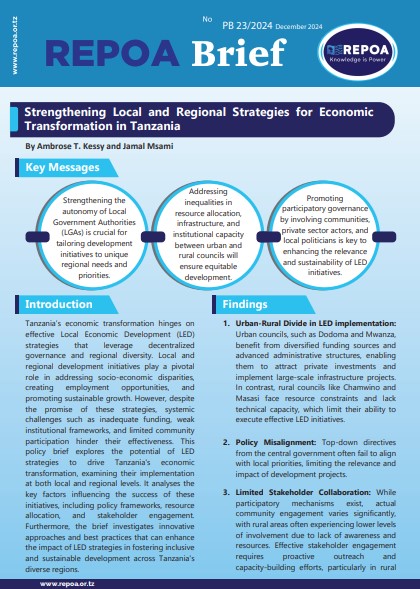
This policy brief explores the potential of Local Economic Development (LED) strategies to drive Tanzania’s economic transformation, examining their implementation at both local and regional levels. It analyses the key factors influencing the success of these initiatives, including policy frameworks, resource allocation, and stakeholder engagement. Furthermore, the brief investigates innovative approaches and best practices that […]
Examining Funding Systems for Local Economic Development in Tanzania: A Key Component of Economic Structural Transformation

This study investigates the funding mechanisms that support Local Economic Development (LED) initiatives across seven regions in Tanzania: Kilimanjaro, Dar es Salaam, Mwanza, Kigoma, Iringa, Dodoma, and Mtwara. LED is recognized as a strategic approach to enhancing local economic capacities through decentralized governance, enabling local authorities to tailor initiatives to their communities’ specific needs. However, […]
Strengthening Transparency and Accountability in the Decentralized Funding Systems to enhance Local Economic Development Contributions in Tanzania
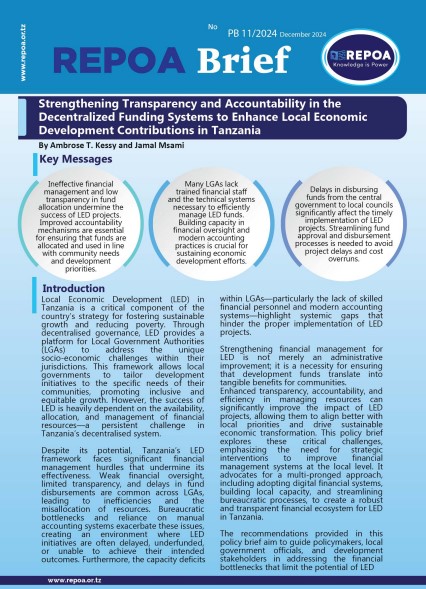
The success of Local Economic Development (LED) in Tanzania is closely linked to the effectiveness of financial management systems at the local level. Improving transparency, building financial management capacity, and decentralising fund disbursement are critical for ensuring that LED initiatives are sustainable and aligned with community development needs. By addressing these challenges, Tanzania can enhance […]
Diversifying Funding Sources for Sustainable Local Economic Development: Leveraging Public-Private Partnerships and Community
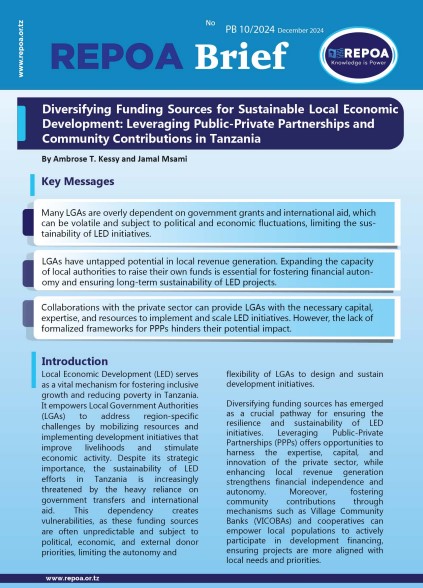
Diversifying funding sources for LED initiatives is essential for building more sustainable and resilient local economies in Tanzania. Overreliance on central government transfers and international aid leaves many LGAs vulnerable to funding delays and budget cuts. By expanding public-private partnerships, enhancing local revenue generation, and promoting community-driven contributions, LGAs can secure more stable and sustainable […]
The Manufacturing Sector in Zanzibar: The Case Study of the Capacity Utilization, Manufacturing Costs, Business Environment, Investment Incentives, and Skills Gaps
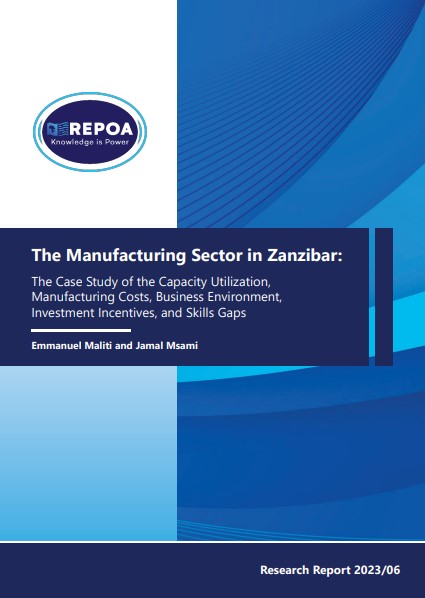
The Revolutionary Government of Zanzibar (RGoZ) is determined to spur industrialization as among the means to meet the Zanzibar Vision 2025 of attaining the “upper middle-income status by the year 2050 through sustainable and inclusive human development1 ” This study aims at supporting such efforts by building a knowledge base and inform policy reforms in […]
REGULATORY IMPACT ASSESSMENT: The Monetary Cost of Complying with Employment Regulations: Experience from the Hotel Industry in Tanzania
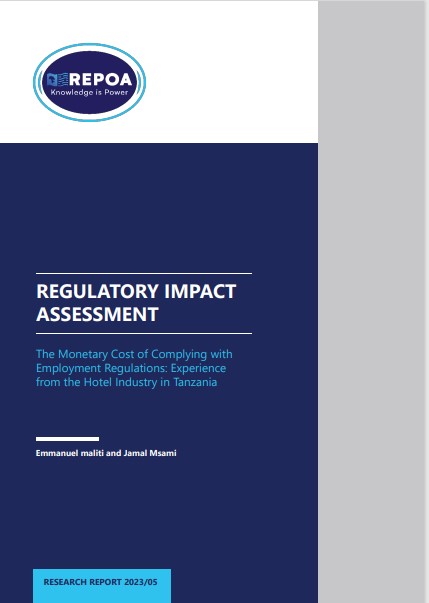
This Regulatory Impact Assessment (RIA) is a result of joint efforts between REPOA and the Hotel Association of Tanzania (HAT). The RIA quantifies the cost that tourism business operators, in particularly the accommodation businesses, incur when complying with the existing employment regulatory regime. The RIA primarily responds to the following questions: How much compliance costs […]
Bargaining Strategies in recent tax reforms in Tanzania
The authors’ motivation for this research and so this Working Paper was on their conceptualisation of revenue bargaining as it hones in on political dynamics whereby the interests and power of members of government and of different revenue providers take center stage. A political settlement approach that conceptualises political dynamics fitting both democratic and non-democratic […]
The Demand and Supply of Political Campaign Financing in Tanzania and Uganda During the 2010s
Campaign financing is defined as money and other resources used by parties and candidates during primary, parliamentary, or presidential elections to secure nomination and election to political office. In this paper, we develop a demand-supply framework for analysing and understanding such financing in newly democratising poor countries, exemplified by Tanzania and Uganda. Like other African […]
Tanzania’s Nationally Determined Contribution (NDC) – An Overview of Progress, Opportunities and Prospects
However, the Kyoto Protocol to the United Nations Framework Convention on Climate Change (UNFCCC) was adopted in 1997 and entered into force in 2005. It was the first attempt to commit industrialized countries (known as Annex 1 signatories) to limit and reduce greenhouse gases (GHG) emissions, while other signatories (non-Annex 1) consisting mostly of developing […]
Climate finance availability and access in Tanzania
Climate finance refers to the financial resources mobilized to fund actions that aim at mitigating the impacts of climate change, reducing vulnerability, and increasing the resilience of human and ecological systems to negative impacts of climate change. Climate finance remains central to achieving low-carbon, climate-resilient development. This policy brief specifically examines Climate Finance Flows and […]
Trade, Productivity and competitiveness
This policy brief aims at assessing the trade development and competitiveness of Tanzania by assessing the productivity of its firms against the background of further integration into the East African Community (EAC). The note addresses both the export premium of an internationalization strategy, the opportunities for specialization within the EAC and the impact of the […]
Productivity premia and firm heterogeneity in Eastern Africa
The gap between national export premium and foreign-ownership premium is stronger in manufacturing firms as opposed to service sectors. Moreover, we find clear and strong productivity premia in size, training programmes and level of development in the manufacturing firms. In the services sector, these premia are always smaller and only significant for medium-sized firms. There […]
Uwiano Kati ya Aina ya Kazi, Taarifa Kuhusu Kazi,Stadi za Kazi, na Elimu
Kwenye dokezo hili tunanatoa muhstasari mfupi wa sura mbali mbali zilizopo kwenye kitabu kiitwacho ‘Youth Transition from School to Work: A Case Study of VETA in Tanzania (Kipindi cha Mpito kwa Vijana Kati ya Mafunzo na Ajira: Mchango wa VETA Tanzania), chenye lengo la kuongeza uelewa wa matatizo wanayopitia vijana kwenye jitihada zao za kutafuta […]
The Work, Information, Skills and Education Nexus in the Transition from School to Work
This brief summarises the theoretical chapters in the book on Youth Transition from School to Work: A Case Study of VETA in Tanzania whose aim is to increase understanding about the barriers to youth employment and transition to work in the context of Tanzania’s new industrialization drive. The brief concentrates on key factors that influence […]
Youth Transformation from School to Work in Tanzania
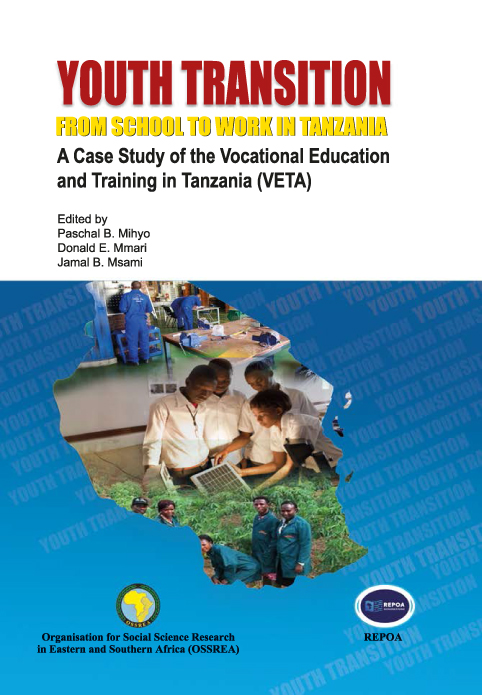
A Case Study of the Vocational Education and Training in Tanzania (VETA) The economic downturn and declining social sector performance in the period 1980-1995 have substantially influenced the debate on skills supply and demand in Tanzania. The downturn saw a substantial decline in the key skills indicator of literacy that had reached a high of […]